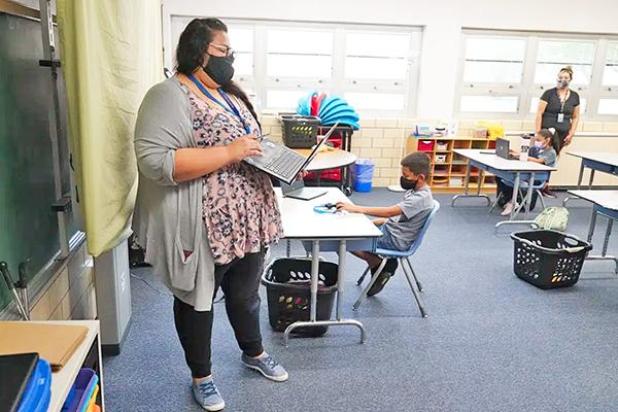
Teacher Jessica Flores directs students as they work on laptops in a classroom in Newlon Elementary School on, Aug. 25, 2020, in Denver, Colo., which is one of 55 Discovery Link sites set up by Denver Public Schools where students are participating in remote learning during the COVID-19 pandemic. Colorado lawmakers are considering joining eight other states in an agreement that would eliminate many of the requirements for teachers to get licensed when they move within the member states. — David Zalubowski | AP File Photo
10 states mull cross-border rules to tackle teacher shortage
Every Colorado school district, like many across the country, began 2023 understaffed. That’s caused classes to be crammed together, school bus routes to shrink, Spanish language courses to get cut from curriculums and field trips to be nixed.
This has prompted lawmakers in Colorado and other states to suggest legislation that would get rid of relicensing requirements for teachers when they move across state lines – an oftentimes cumbersome and costly process of waiting periods, licensing fees and expensive exams.
The idea for an Interstate Teacher Mobility Compact was first proposed by the U.S. Department of Defense and is designed, in part, to support military spouses. It would effectively allow teaching licenses to be viable across members of the compact, cutting through the current 50-state patchwork of disparate requirements.
Colorado’s House education committee voted nine to two on Wednesday, Feb. 1, to send the legislation forward in a hearing.
Nine other statehouses are considering joining the compact, including Hawaii, Washington, Kansas, Georgia and Mississippi. For the compact to take effect, 10 states must approve it.
The national teacher shortage, exacerbated by deep losses during the pandemic, has left states scrambling to hire and retain educators. It’s pushed school districts across the South to accept candidates without teaching certificates or formal training to staunch the losses.
“The idea of this bill is that it removes a barrier for moving into the state,” said Colorado Democratic Rep. Meghan Lukens, one of the bill’s sponsors. “By participating in this compact we will allow the seamless transfer of teachers to our state while maintaining the integrity of our teacher licensing.”
Some worry the change won’t make significant difference as long as teachers are underpaid in a state with sky-high housing costs.
In 2020, Colorado paid teachers an estimated average of just over $60,000 annually, below the national average of about $65,000, according the National Center for Education Statistics, even though it’s one of the most expensive states to live in. On those salaries, only about 20% of available homes in Colorado are affordable to teachers, according to a study by the Keystone Policy Center.
“I think this is another example of a solution that isn’t meeting the problem,” said Philip Qualman, superintendent at Eagle County School District, which includes the ski town of Vail west of Denver.
The full article is available in our e-Edition. Click here to subscribe.
